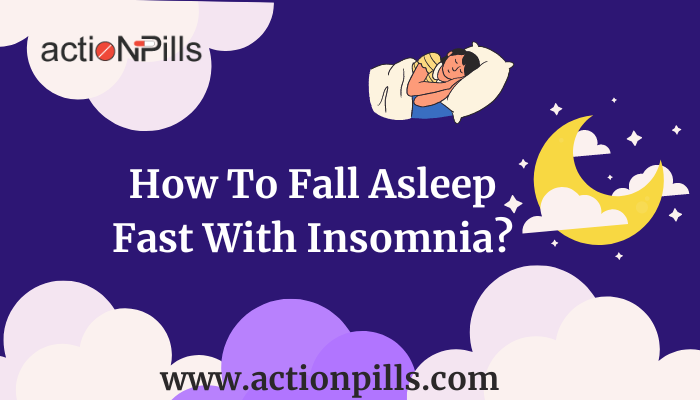Proper sleep is crucial for physical and mental well-being. About 35 percent of the American population experience difficulty in sleeping which might have negative effects on their physical and cognitive ability. This has been researched by the Centers for Disease Control and Prevention (CDC). In this article, we have discussed some of the effective techniques that will work on insomnia very well. Let’s know, how to fall asleep fast with insomnia.
Poor sleep increases the risk of:
- Type 2 diabetes
- Stress, anxiety and depression
- Cardiovascular disease
- Impaired Learning, memory, and mood
- Obesity
Overview of Insomnia:
Insomnia is a very common sleep disorder. Insomnia causes trouble in falling asleep, staying asleep, or getting good quality sleep. This condition can be short-term (acute) or could last for a long time (chronic).
Insomnia can get in the way of your daily activities and may make you feel sleepy during the day. About 10% of the world’s population experience insomnia which qualifies as a medical condition. It’s generally not dangerous, and there are several ways, including medications (Ambien, Zolpidem, Restoril) and mental health options, to treat insomnia.
Tips To Fall Asleep Fast With Insomnia:
Military Method:
This technique focuses on muscle relaxation, mental visualization, and breathing. Listed below are the steps:
- Lay down on your bed.
- Beginning with your face, tense your muscles and then loosen them as you take deep, calming breaths.
- Repeat this process until you feel at ease.
- Clear your mind. Then, picture a relaxing scenario like peacefully lying in a canoe on a calm lake or gently rocking back and forth in a completely dark room.
- If this doesn’t work, repeat the words “don’t think” to yourself for 10 seconds and try again.
Over time, this technique should help one go to sleep in less time.
4-7-8 Method:
The 4-7-8 method focuses on distracting yourself from anxiety. Listed below are the steps:
- While lying down in bed, relax your tongue and rest it on the roof of your mouth
- Slowly exhale through your mouth, completely emptying your lungs.
- Breathe in through your nose for four seconds.
- Hold your breath for seven seconds.
- Exhale for eight seconds.
- Repeat this process at least four times.
This 4-7-8 method is based on a traditional yoga technique named ‘pranayama’.
Turn Down Tech:
Looking at your screen before bed can negatively impact the quality of sleep and even mess up your sleep cycle. Electronic devices such as smartphones etc., emit blue light that stimulates sunlight. Using your gadgets for too long can also cause sleep deprivation.
Try reducing screen time by:
- Playing an audiobook
- Listening to music
If you can’t pull away from the screen at night, turn on night mode on your device. This will make the screen emit warmer colors, reducing the effects of blue light before sleeping.
Take a Warm Bath or Shower:
A warm bath has been known for a long time as a remedy to aid sleepiness after a long day’s work. Research shows that a warm shower or bath helps to fall asleep 36 percent faster. Step into the tub for a nice and relaxing soak. Taking time for a hot bath or shower can also improve your quality of sleep, even during warm weather.
Avoid Caffeine:
Caffeine is a major reason for keeping from falling asleep. Studies say that caffeine can affect the quality of sleep up to six hours before going to bed.
Also avoid caffeine sources such as:
- Hot chocolate
- Chocolate
- Soda
- Coffee or chocolate-flavored ice creams
Create a Bedtime Routine:
Maintain a bedtime routine to help set your inner body clock. The bedtime routine should be catered to one’s self-care preferences. There’s no one specific bedtime routine that works for everyone, but if you stick to a simple night ritual, your body will adapt to a perfect routine.
Increase Sunlight Exposure:
Getting exposure to sunlight during the day could help you fall asleep faster in the night. Studies say that sunlight could help in regulating the body’s circadian rhythm.
If you are still unable to sleep after trying all these tips, then consider consulting with a licensed somnologist (sleep expert). The medical practitioner can properly diagnose the cause, whether it’s chronic insomnia or any other sleep disorder.
Conclusion:
Proper sleep enhances both physical and mental state. But having trouble falling and staying asleep is frustrating and could affect your mental and physical health.
The above-mentioned techniques may help relax and calm your mind before bed, which could help you sleep better, and you could wake up with high energy the next morning.
